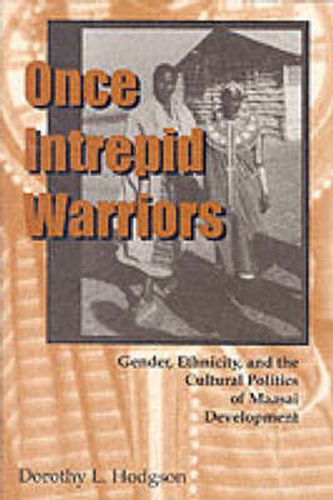Readings Newsletter
Become a Readings Member to make your shopping experience even easier.
Sign in or sign up for free!
You’re not far away from qualifying for FREE standard shipping within Australia
You’ve qualified for FREE standard shipping within Australia
The cart is loading…






Drawing on archival sources as well as extensive fieldwork in Tanzania, Dorothy L. Hodgson explores the way identity, development, and gender have interacted over time to make the Maasai what they are today. By situating the Maasai in the larger political, economic, and social context of Kenya and world events, Hodgson shows how broader forces have had an impact on the construction of Maasai lifeways, especially gender relations. Hodgson pays particular attention to how development has affected Maasai lives. Development is not seen as a fixed practice, but as a historical process that reflects the larger forces at play, and critical assumptions by government and development officials, such as the belief in Maasai exceptionalism–that they must be maintained as a warrior nation, have determined the types of development schemes that were believed to be most beneficial to the Maasai. But rather than reinforce the vision of intrepid warriors, development has instead performed a key role in creating new gender hierarchies, new responses to the pressures of modernity, and ambivalent attitudes toward education and local, national, and international politics.Interspersed throughout Hodgson’s narrative are brief profiles of Maasai men and women. These intimate portraits bring Maasai voices to life and show that they were never passive participants in their own history. Once Intrepid Warriors reflects the complexity and variability of Maasai society as it has responded to outside interventions and internal struggles over how to protect Maasai interests in a changing world.
$9.00 standard shipping within Australia
FREE standard shipping within Australia for orders over $100.00
Express & International shipping calculated at checkout
Drawing on archival sources as well as extensive fieldwork in Tanzania, Dorothy L. Hodgson explores the way identity, development, and gender have interacted over time to make the Maasai what they are today. By situating the Maasai in the larger political, economic, and social context of Kenya and world events, Hodgson shows how broader forces have had an impact on the construction of Maasai lifeways, especially gender relations. Hodgson pays particular attention to how development has affected Maasai lives. Development is not seen as a fixed practice, but as a historical process that reflects the larger forces at play, and critical assumptions by government and development officials, such as the belief in Maasai exceptionalism–that they must be maintained as a warrior nation, have determined the types of development schemes that were believed to be most beneficial to the Maasai. But rather than reinforce the vision of intrepid warriors, development has instead performed a key role in creating new gender hierarchies, new responses to the pressures of modernity, and ambivalent attitudes toward education and local, national, and international politics.Interspersed throughout Hodgson’s narrative are brief profiles of Maasai men and women. These intimate portraits bring Maasai voices to life and show that they were never passive participants in their own history. Once Intrepid Warriors reflects the complexity and variability of Maasai society as it has responded to outside interventions and internal struggles over how to protect Maasai interests in a changing world.